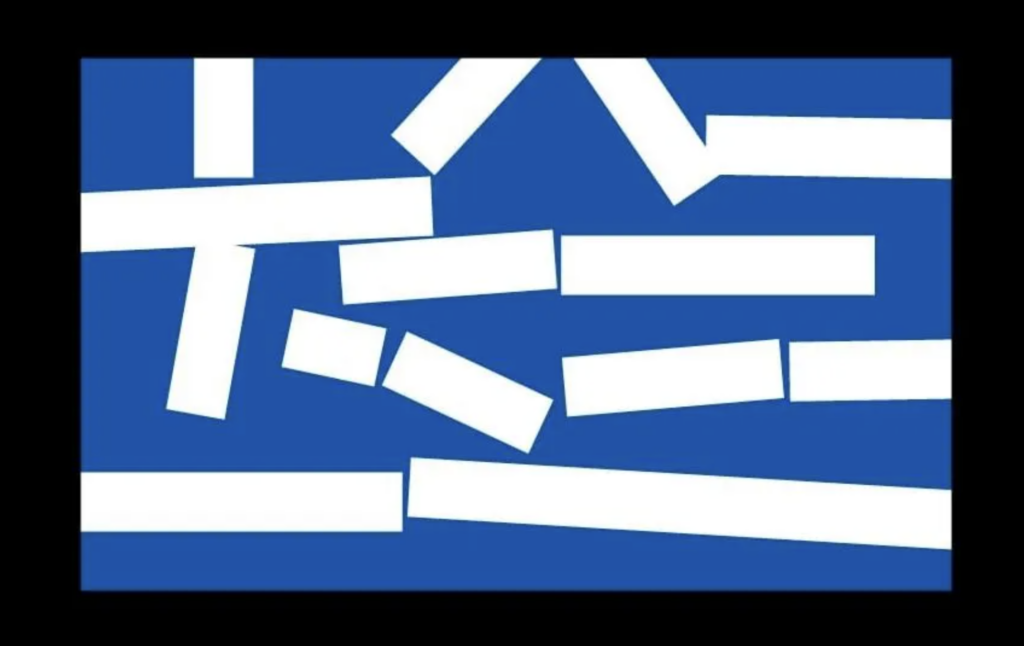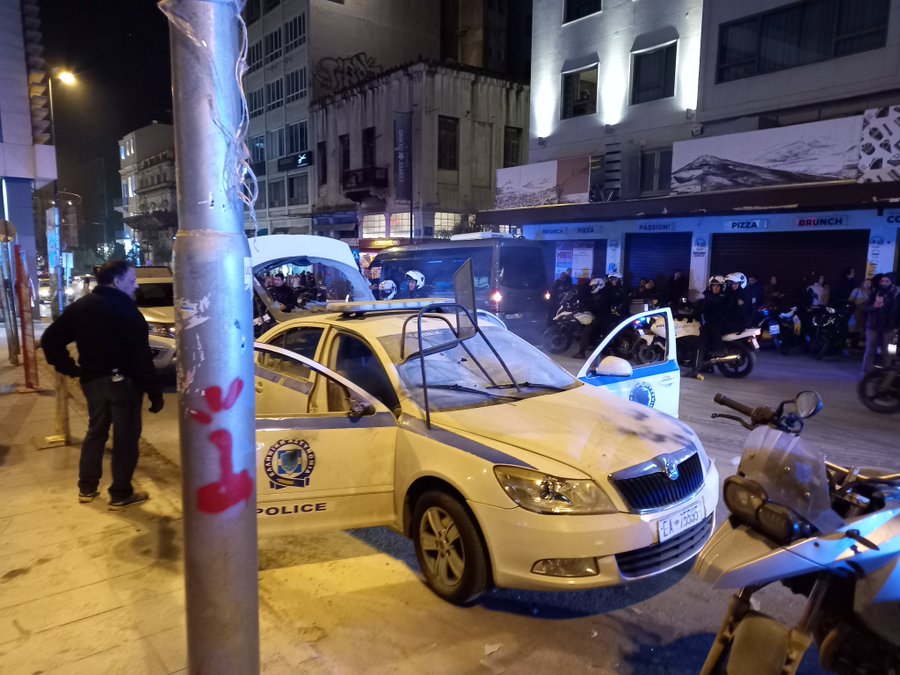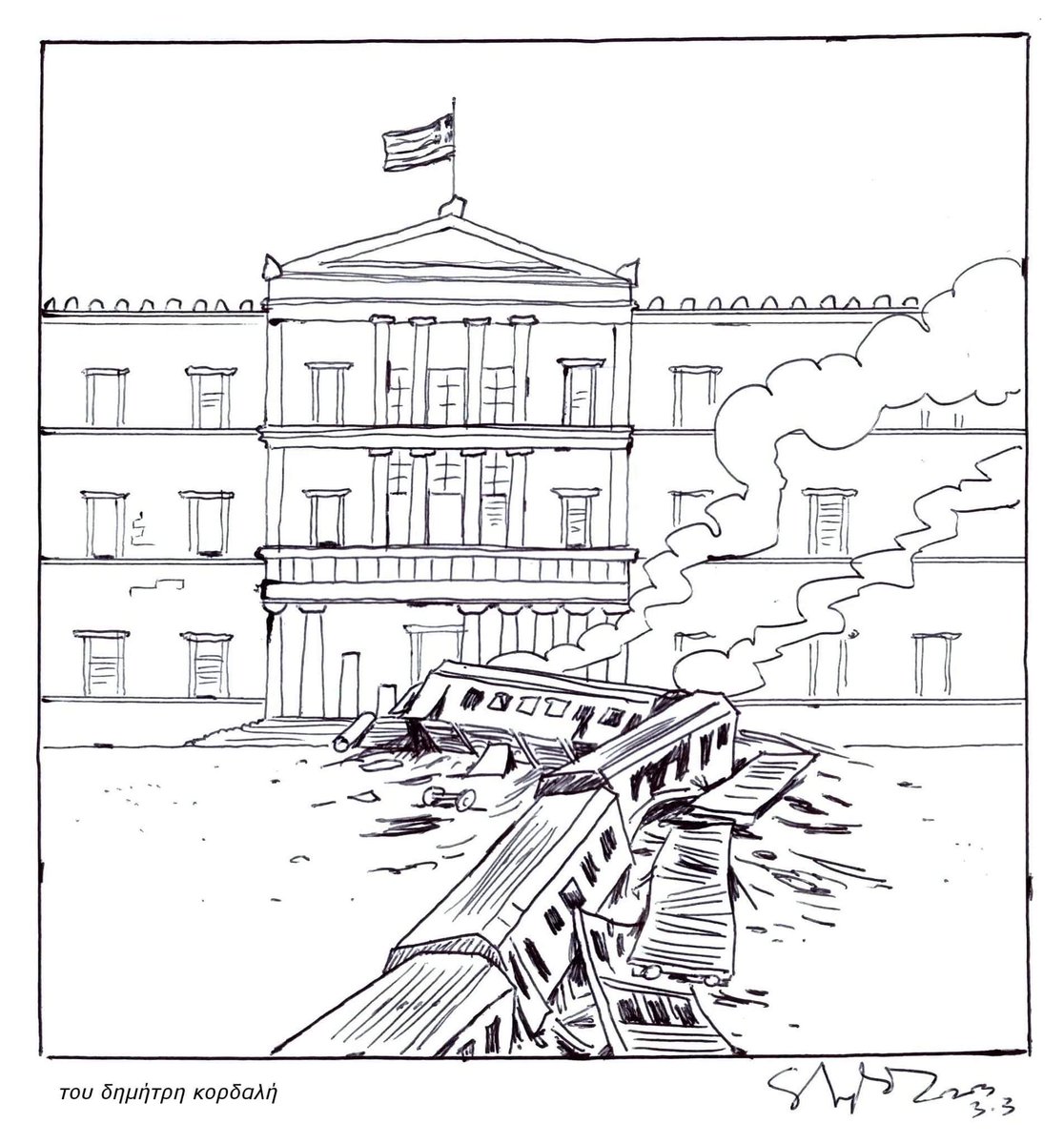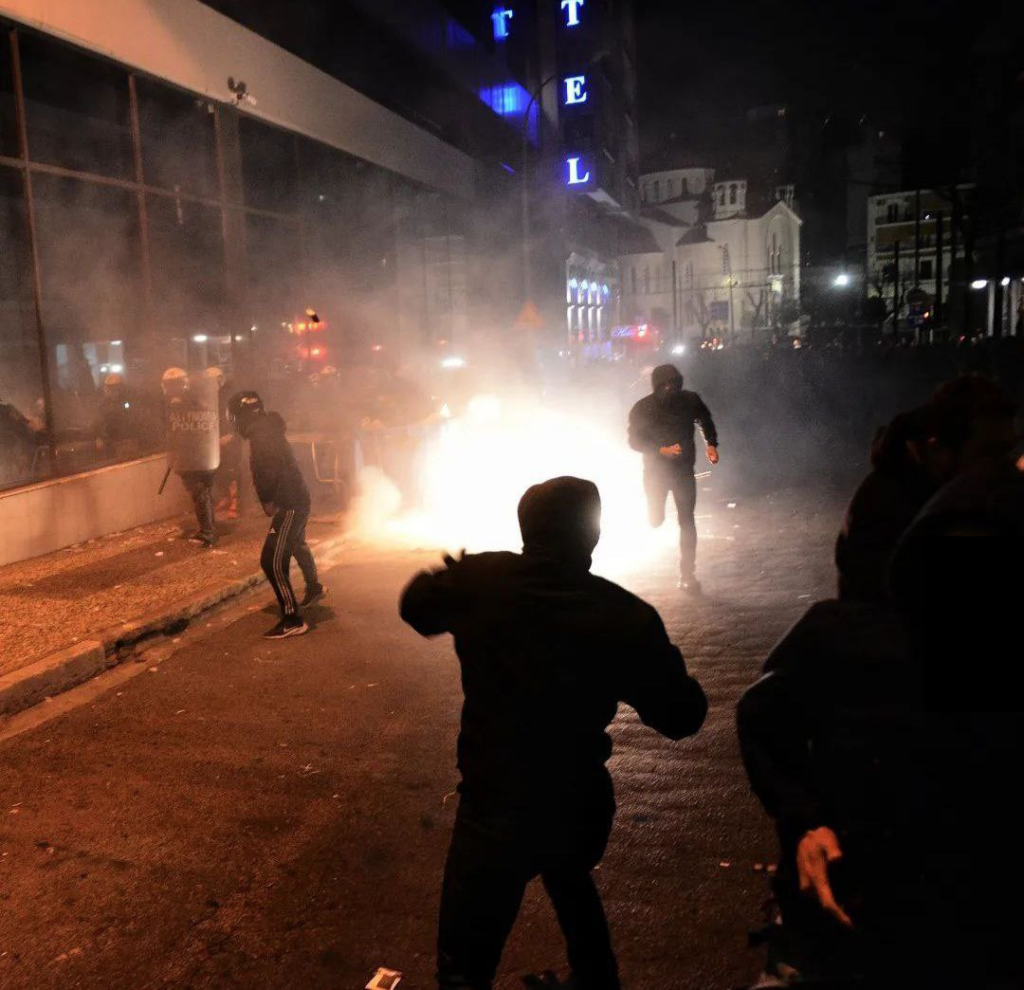SECOND DAY AFTER THE DERAILMENT: FRIDAY 3 MARCH
Rather than just one funeral, Greeks hold multiple services for their dead: a week, forty days and then a year after the passing. This ancient tradition means that the 40-day remembrance ceremony for the victims of the train collision, effectively a second funeral, would have coincided with planned national elections.
Greece's ruling party, New Democracy, has for many years skewed further and further right in an attempt to keep Greece's sizable racist, nationalist & fascist voter constituencies under its tent, but its original gimmick and the face it still tries to show the outside world is a party of center-right "technocrats." They present themselves as modern, unsentimental, business-minded experts who can handle the technical complexities of 21st century governance. While the horrific train collision would be bad for any officeholder, the train disaster, caused specifically by safety infrastructure negligence– negligence that the transport unions have complained about for years– is uniquely damaging to the projected image of these anti-union, pro-privatization junta hacks who claim they're the only ones smart and competent enough to get things done.
On Friday we heard the first rumors, since confirmed, that the country's elections will be delayed for an unspecified period. The government is trying to spin this delay as a gesture of respect, but of course it's a cynical tactic to try and hold power, since they know the 40-day remembrance will rekindle outrage.
After the massive nationwide turnout for demos Thursday, the government summoned (or perhaps was assigned, by their puppeteers) a U.S. "crisis management" team. These P.R. experts induced a whiplash-inducing reversal of official attitude. The Prime Minister, who'd in previous days dismissed the collision as merely a matter of an individual stationmaster's "human error," went on prime-time TV to apologize somberly for the government's failure to ensure proper train safety, even stating "we will not hide behind 'human error.'" The transportation minister, who two weeks ago had made a finger-wagging speech scolding transport unions for bringing up safety concerns, resigned.

A wide range of groups, from trade unions to anarchists, called for a demo in Athens Friday at 6:30 p.m. The striking workers of Greece's national and regional transport networks agreed to operate for a window of a few hours that evening to assist protesters. After the experience Wednesday, when we showed up just in time to get teargassed, we tried to be a little more timely. Most of the demos I go to only begin moving an hour-plus after the stated start time, but these post-train-crash demos across Greece had been drawing a lot of people who wouldn't normally come to demos, people who don't run on anarchist time.
Three of us set off for parliament, but a half-mile before we got there, we encountered nearly a thousand people jamming the road around the Panepistimiou metro. They were chanting and carrying big banners that called the government murderers and blamed capitalism & privatization for the derailment.
Along with the on-air apology by the prime minister, Greece's suddenly contrite government and their shills had planned and been heavily promoting candle-lit silent vigil events around the country for Friday evening, as well as some kind of lockdown-esque "clap for the carers" thing where people were supposed to turn off their lights at a certain time.
The people gathered at Panipestimiou were not silent; the crowd was roiling. People were having emphatic conversations with each other about how angry they were. I mentioned the anti-privatization signs; the crowd was heavily communist. While I'm what the Greeks call "black anarchist," meaning a nihilist, negation-focused hater of every economy and every form of state, I do have a baseline of respect for Greek communists that I don't have for communists in the so-called first world.
Greek communists waged guerrilla (and civil) war against fascism and colonial powers throughout the 20th century. They have been hunted, imprisoned, starved and most often outright murdered by multiple Greek dictators, by Bulgarian and Italian fascists, by real-deal third-reich nazis, by NATO and the colonial British, then (until 1974) by a far-right military junta, and on and on. They have fought and died in Greece's streets, fields and islands; their legacy is one of tremendous valor. I am no friend to authoritarians, and of course they're dangerously wrong about the state's potential as a liberatory force, but no matter how much the commies here piss me off I'm always conscious that the red of Greek communism is a red of proud working-class blood spilled in furious, dedicated multi-generational rebellion against tyranny.
The biggest communist party here is KKE; they hate anarchists. They avoid us at demos, and on rare occasions when their youth wing catches an anarchist without backup, they beat us up. They have, unforgivably, defended government buildings against anarchists during insurrections, and they constantly spread obnoxious Facebook-boomer lies about how all anarchists are secretly undercover cops. I'm under no illusion that they are potential allies, but they are human beings, and Greek, and in this moment it was clear that anger at the government was very strong among Greek people regardless of ideological affiliation. While KKE wasn't at Panepistimiou as a formal bloc Friday night, the dozen other commie cadres present with their welter of organizational acronyms and angels-on-a-pin doctrinal differences included KKE-type stalinists and leninists as well as (this being Greece) maoists, gonzalists and more esoteric fractal offshoots.
Protests continue on the third day of the train massacre in Greece due to state negligence. People gather once again this evening in Athens Propilia. #Τεμπη #Τεμπη_Τραγωδια #Λαρισα #τρενα #τραυματιες #Antireport #Greece pic.twitter.com/imA5TQLU2j
— Partizan Yunanistan (@partizanGreece1) March 3, 2023
A scruffy crowd of anarchists was loitering around the garden by the University of Athens rectory, the former parliament building also known as Propylaea. We joined them. Shortly after, the demo got rolling, maybe a thousand people including a few hundred anarchists in the rear. We followed a predictable route, marching away from parliament at first, then cutting down to Stadiou and looping back towards it. The energy was tremendous, and there were no visible police anywhere around us.
My comrade speculated, I think correctly, that the state was trying a "hands-off" approach to defuse anger. It's not a terrible strategy, since it has felt to me occasionally like demos here are hampered by the absence of cops, as if the drama can't fully blossom without them or reach climax without the state's active antagonism. Plenty of graffiti went up, but in general the march was only noisy. While banks and most upscale businesses were sealed behind metal shutters, there were various other potential targets left unscathed.
I tried not to complain to my companions, since I have learned that even the Greek anarchists I'm closest to are not overeager for tactical critique from clueless yankee transplants. A militant march with loud chanting is, I think, more affirming and inspiriting to a Greek anarchist than it is to a simplistic Peter-Pan manchild like myself. The anarchist chants are great– full of violence and imprecation, poetically satisfying while still hair-raisingly conflictual– but my eternally adolescent heart always longs for smashy-smashy.
Our piece of the march got stalled out just past the alley Voukourestiou, where Stadiou does a little twist-and-turn before opening out into Syntagma. I have developed a clear theory as to why this spot is so often a bottleneck, but I would need diagrams to explain it, and I suspect most readers wouldn't find the specifics interesting. Speaking of details most won't find interesting: at Syntagma Square, Stadiou technically changes name to Plateia Syntagma for the length of the square, then changes again to Fillenon. Panepistimiou, parallel on the Square's east side, changes at the square to Leoforos Vasilis Amalias. At the cost of accuracy, but as a feeble effort at clarity, I'm going to incorrectly call these streets Stadiou and Panepistimiou throughout.
With the march treading water, my partner and I slipped out onto the sidewalk and walked ahead to take a look at Syntagma– the wide public square and boulevard in front of the parliament building. The square was nearly empty by Friday-night standards, but there were a few hundred people up in front of parliament itself: it was the silent candlelight vigil, plus a sizable protest group autonomous from the march we'd arrived with. The large, mostly communist groups comprising our own march's front two thirds were gradually filtering through this standing crowd. I took a piss in a dark corner of the park, but had to wait to use the corner because two guys were doing something sketchy there with a backpack. Cool sketchy, not drug-deal sketchy. My optimism bolstered, I bought a beer from the square's kiosk– bless the kiosks, every rioter's friend– and found my companion again.
Still, nothing much seemed to be happening. The march was at least moving again, making a long, slow circumambulation of the square. We were discussing when or if we should jump back into it when the tectonic plates of the crowd now lining four sides of the square began a rapid shift. Liberal-looking middle-class people with candles started to flow away from parliament down Vasileos Georgiou in a slightly herd-panicked manner, and a larger group of people in black were moving aggressively towards parliament up Othonos, the Square's other side.
The anarchists walked faster; some began to jog; then everyone was jogging; then some began sprinting– then the whole bloc was charging up the hill full tilt. I cut diagonally towards the front line of the charge and emerged onto the boulevard in front of parliament where I beheld a sight which, if it was the only thing that had happened that night, would have still been more than enough: 50 or more people attacking parliament and its guards with explosives. Molotovs, yes, but also gas bombs and fireworks. For Beavis types like me it's cool just to see shit go boom, but my hope for every real rebel reading this is that you're lucky or ambitious enough to someday witness the literal, non-symbolic physical seat of your nation's government firebombed by anarchists. The feelings this evokes are indescribable.
MAT (riot police) ran out from the wings of parliament to skirmish. Our team's explosions were answered by flash grenades; screeching canisters billowed teargas. The number of cops emerging from parliament wasn't nearly what I'd have expected, however, and an immediate hail of stones and homemade incendiaries greeted them. Not only were the anarchists extremely aggressive, but the larger crowd didn't scatter as they sometimes do when the flashbangs-and-molotovs phase of the evening begins. They were steadfast, maintaining a thunderous chant of MURDERERS, MURDERERS. Many had linked arms. As anarchists darted in and out, lobbing fire, the larger crowd shifted back and forth amoeba-like to avoid tendrils of teargas, but continued to hold the street in front of parliament. We were contesting the space in a way I hadn't often seen: every time the cops rushed the crowd, it flowed back from them without fleeing. After a couple rounds of this, fighters emerged from the crowd to directly counterattack the police. These frontliners were not only anarchists; this was a nonsectarian moment. I will remember it until I die; while molotovs blazed overhead and sizzling scarlet flares dyed the whole scene a spooky purple, Greeks engaged in hand-to-hand combat against riot cops.
— Παρασιτεί Μετέωρος (@parameteoros) March 4, 2023
My partner's shout got my attention: there was a strange living sculpture squirming down the hill beneath a streetlight at Othonos and Stadiou. It was like those cartoon depictions of a brawl, but inverted, because everyone was in black. Fists and sticks were flying in and out of the clustered, writhing shadow, and in the amalgamation's violent center, surfacing only for a split second at a time, I saw the gleaming white helmet of a DELTA motorcycle cop. He was being gang-beaten by what looked like either 3, 6 or 12 black-clad heroes. In the chaos it was impossible to count, and more were dashing toward the fray– people were literally bellowing with joy as they ran towards it. Unfortunately I was still many yards away when the police motorcycle cavalry arrived, and I peeled off to the right. All night I'd been wondering: where were all the cops? Well, here they all were, a great deluge of them spilling from the alleys on motorcycles and on foot.
A comrade yelled "Ermou" and I made for it as fast as I could. My partner came racing back from the other direction; there were cops swarming along the other side of the square now too in a pincer. I could see ahead of us a crowd of a hundred or so hooligans charging down Ermou into the heavily touristic shopping district of Monastiraki. We followed– all around us as we ran, the pale, terrified faces of tourists blazed like round lamps. Shopkeepers were scrambling, somersaulting to slam shut their shutters, and Ermou was transformed from a sedate, upscale retail destination into a coursing river of tumultuous movement, smoke and shouts.
We knew the police were behind us, but when their grenades started to land in front of us we understood we were being overtaken, and we half-jumped/half-fell into side alley, clambering among the tables and chairs of a spanish-themed cafe for safety from the cudgels of the cops.
People screamed insults at the platoon as it thundered past: fascists! rapists! murderers! A lifetime in the U.S. had conditioned me to expect the general public to be cop-loving cowards, but this was Athens in the early stages of a popular uprising, and everyone from grandmothers to middle-class dog walkers was hurling invective at the police.
Once the police had passed by our position, we re-emerged onto Ermou and continued towards Plateia Monastiraki, the main square, which we could see down the hill was full of fire and flashing lights. By the time we arrived, the main body of the anarchists that had preceded us had scattered, but police were fire-extinguishing a parked police cruiser that had, before being set on fire, been thoroughly looted and had its windows smashed with cafe chairs.

A fat middle-aged cop who'd apparently been in the car was shaking as he explained to the other police what had happened. "They hit us, they hit us… so fast, out of nowhere, all the windows at once."
More and more police were arriving, and they were pissed. My companion wanted to linger; I wanted to leave. The cops grabbed a passerby for taking photos of the burned-out car but released him when the crowd began jeering.
We made our way through Plateia Monistiraki slowly, slow enough to still be leaving when a further reinforcement of motorcycle cops arrived and started seizing immigrants. I am not here to present myself as other than I am: while I am in solidarity with immigrants and the economically downtrodden, I pulled my companion away from this latest confrontation. We'd both already had very direct and memorable face-to-face time with cops that night, encounters not specified in this accounting, and I was concerned what would happen if we were recognized.
Conveniently for our departure, some civic-minded individuals had smashed the nearby metro station's turnstile gates to flinders, rendering public transport free for all. There was already another big Syntagma demo called for Saturday. For Sunday, March 8th, there was talk of a nationwide general strike.

